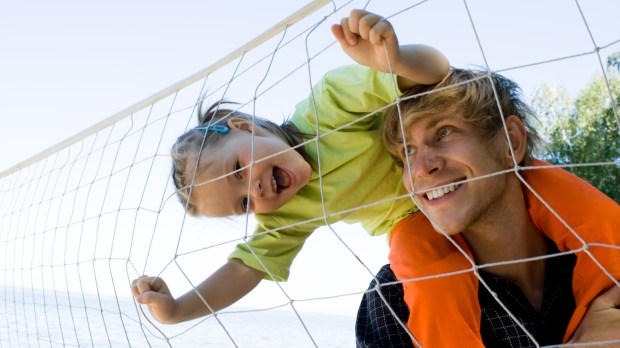Lenten Campaign 2025
This content is free of charge, as are all our articles.
Support us with a donation that is tax-deductible and enable us to continue to reach millions of readers.
Our family is in a volleyball phase. My oldest daughter has become a serious high-school volleyball player, so my 3-year-old has been hanging around a lot of games and practices.
In addition to becoming something of a team mascot, she’s now a self-proclaimed expert on the sport. She knows volleyball. She has her own blow-up beachball that looks like a volleyball. Every day I come home from work and am greeted by a child with blond pigtails, holding that ball. She looks at me with pale blue eyes, the same eyes her mother has, and sweetly asks if I’ll practice with her. Of course I will.
She’s a perfectionist, a technician crafting the perfect volleyball skillset. She demands that I either, “set” or “bump,” and chastises me if I hit the ball wrong. She’s memorized all the little pre-serve tics the older girls have and she imitates them perfectly, rubbing the ball thoughtfully, hitting the palm of her hand against it, wiping the dust off the bottom of her feet. Then she smacks the ball directly into the ground and claims victory. She has won the point.
She makes me call out “mine” when I’m intending to bump the ball, and if I neglect to call out or do something else wrong she makes me run the drill again. As a little girl, she’s sweet; as a coach, she’s a tyrant. It’s only a matter of time until she has me running punishment laps around the kitchen island.
I haven’t even mentioned yet that everything out-of-bounds is lava.
I’ve played these toddler games with all six of our children. As they get older, I try to keep up with their changing interests. What matters isn’t the games or hobbies themselves – obviously hitting a beach ball around with a toddler isn’t going to make or break a professional volleyball career – I simply cherish the opportunity to be part of their lives.
It goes both ways. I open up my life to them as well. I show them what I love, play new music for them, loan them novels, invite them to make music with me at the piano, draw trees and fruits with them, and invite them to get them involved at church. My wife cooks and gardens with them and is heroically patient in allowing them to slowly build up their skill level and interest.
We’re building relationships.
The connection we’re creating and maintaining with our children will, hopefully, have a transformative effect. It’s an effort that takes time. Much of that time can seem wasted, but I promise it isn’t.
Children aren’t perfect clones of their parents, so it’s a balancing act between showing them what we already love, and being willing to follow them into the new territory of what they love. It doesn’t matter that I know nothing about volleyball. My daughter loves it so now I do, too. I see the game through her eyes.
That’s always the way it is with those we love, right? We begin to value what they value. They transfer their passions to us and, even if it isn’t all that appealing at first to, say, practice volleyball for an hour every day, it becomes an avenue to a precious gift – a way to grow closer together and allow our lives to mingle.
I say that this time spent together is transformative because any two people who linger in each other’s presence share their lives in a special way. There’s a subtle bonding, a convergence of value. As a father, I try to model positive virtues so that the values I share with my children through this convergence are for their benefit. Unfortunately, I do impart to them my bad habits and flaws, but that’s the challenge of fatherhood, striving to become a better person so my children have the encouragement to be better than I have been.
St. Athanasius’ wisdom
The process of how we influence each other through the mutual sharing of lives reminds me of the famous saying of St. Athanasius about Christ: “He became what we are so that he might make us what he is.” He’s talking about the way in which God takes on human flesh and shares his life with us. He also allows us to share our life with him. When it comes to the Catholic faith, it’s a lived reality, a divine exchange of goods that shapes us as individuals. We come to love what God loves and desire what He desires.
As a new father, my first instinct was to impose a stern regime on my children, tell them how they were going to behave and punish them if they didn’t act how I expected. It didn’t work very well. I found myself befuddled about why they wouldn’t just do what I wanted. I then realized that, to a great extent, they were mirroring my own behavior back to me.
The problem, really, was me. They’re individuals with their own unique personalities and agency, filtered through the influence of their mother and me. Although we still have basic expectations of behavior in our house, I’ve come to see the best way to help my children is to improve myself so that what I share with them will be of value.
This is why I promised myself that, even if I’m tired or don’t want to, I’ll always agree to play games with my children and participate in their interests. This sharing of our lives is the exact same gift by which God saves us. He plays volleyball with us, so to speak. It doesn’t sound all that important, to hit a ball around for a while with a child, but it actually means the world.



